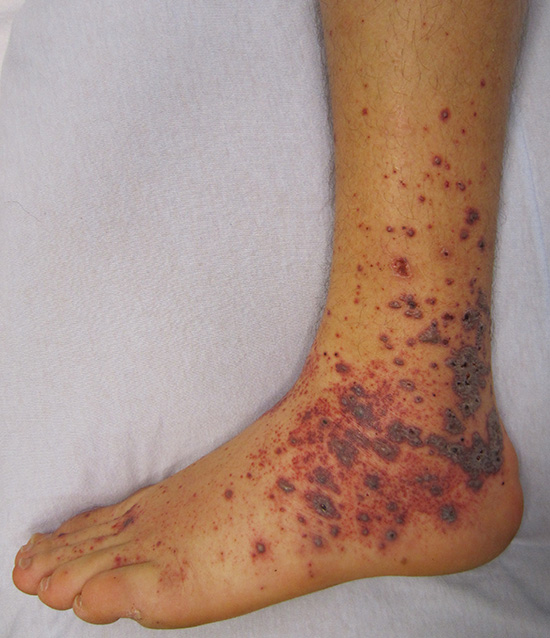Itchy Skin Causes You to Raise Your Hands in Desperation!
Tips to Stop Itchy Skin Where it Starts
Itchy skin causes all kinds of discomfort, annoyance, and exasperation. You know the feeling: places on your skin start to tingle and prickle, demanding to be scratched.

Unfortunately, if you give in and use your fingernails to find relief, the itching just becomes worse, and you may even risk scarring and infection!
Known in medical circles as pruritus, itchy skin is something that most, if not all, sentient beings have experienced over the course of their lives.
There are so many itchy skin causes, it’s hard to know where to begin to manage this uncomfortable condition. Once you find the cause, the road to relief can be a lot easier to navigate.
I hope we can help you to stop itchy skin where it starts!
What Causes Itchy Skin?
Itching happens when certain nerve cells that lie just under the surface of your skin are stimulated, resulting in that all-too-familiar sensation.
The trigger for the itch could be something as minor as an insect bite, or it could be something more significant, such as a systemic disease or condition.
Sometimes itchy skin is visible as a red area, a rash, or a welt, but often your skin will look perfectly normal, even though you’re "itching to scratch". Itchy skin with no rash is even more frustrating because it's completely invisible!
In any case, there are dozens of itchy skin causes, and knowing what causes your itching can help you deal with it.
It Could Be the Environment
Our surroundings and the climate we’re exposed to account for many itchy skin causes. Where we live, the time of year, our daily habits, and even our genetic makeup play a role in exposing us to the factors that make us itch.
Weather, whether it’s too hot, too cold, too wet, or too windy, can create many problems for your skin.
Winter temperatures, wind, and heated environments can rob your skin of its natural moisture. Dry skin is one of the common itchy skin causes, especially in older people and people who have inherited it.
Heat rash, or "prickly heat," occurs when your ability to perspire is impaired, and the skin reacts to the backed-up perspiration with a red itchy rash.
This is very common in babies, whose sweat glands haven’t developed, but many adults suffer with this problem as well.
Sunburn damages the surface of the skin, and the nerve endings just under the surface react by itching.
Allergies are famous for causing itchy skin, as well as a myriad of other symptoms. Whether it’s something in the air, something you ate, something you applied to your skin, or something you wore, the histamines produced will go right to work irritating those nerve cells, and you’ll be itching!
Stress can cause some people to develop hives, which are not only itchy, but unsightly. Imagine a bride on her wedding day, wearing her beautiful gown, looking radiant, and secretly trying to scratch the raised red welts on her arm as she takes her vows.
It’s bad enough when an allergen causes hives, but it’s just a little too much when you’re already stressed out and you have that kind of extra problem to deal with!
The Great Outdoors Can Cause Itchy Skin!
Creepy crawlers, fliers, and buzzers are itchy skin causes at many a summer picnic, a fishing expedition, a campout, or just a nice walk through nature.
Mosquitoes, ants, bees, spiders, and other assorted pests seem to just be waiting to have a taste of you as soon as you step outside! :(
Plants such as poison ivy, poison oak, and poison sumac are some other itch factors to be found in nature.
While these plants cause a problem for anyone who gets close enough to make contact, even seemingly benign flora such as grasses and flowers can cause itching in people who are allergic.
Quick Relief for Itchy Skin from
Environmental Irritants
If you find yourself suffering from itchy skin because of environmental factors, there are some simple ways to find relief.
- Fight dry skin by keeping hydrated ... follow your body's thirst, and if possible, drink at least 8 glasses of pure, clean water each day.
- Avoid long, hot showers or baths, which can further dry out your skin.
- Apply non toxic, fragrance-free moisturizers to protect your skin from the drying effects of your surroundings. See our page on Dry, Sensitive Skin for tips on low irritation moisturizers.
- For localized relief, you can apply soothing remedies to the spot. Calamine, chamomile, eucalyptus, menthol, and camphor are all tried and true methods for getting itching under control, although if you have very sensitive skin, you might even react to these!
- If you have hyper sensitive skin, I recommend Skin Doctor, a very gentle but effective remedy that stops itching even if you don't exactly know the cause.
If natural remedies don't work for you, your doctor may prescribe corticosteroids and topical or oral antihistamines. These can have side effects so should not be used regularly, but in an acute case of itching, these can be a great help.
In any case, do whatever you can to avoid scratching that itch!
Itchy Irritants are Everywhere!
Anyone with sensitive skin knows that there is a long laundry list of products that need to be avoided. Coming into contact with these irritants can cause sensitive or allergic skin to react in a variety of ways, including itching.
If you have a problem with irritants, you want to avoid products that contain the following:
Fragrances can be found in soaps, bath products, laundry products, and a host of other items that we all use every day. We even have to be careful about fragrance added to our tissue and our toilet paper!
Chemicals, solvents, and preservatives are added to our cosmetics and beauty products. Some are relatively neutral, but some can be highly irritating and cause your skin to break out. See our Safe Cosmetics Guide for more information about this.
You wouldn’t apply regular motor oil to your face, so you certainly don’t want those same chemicals in your night cream! Itchy skin could be only one of many unknown side effects from it.
Sometimes even the clothing we wear can be a source of itchy skin causes. Allergies to fibers such as wool, chemicals in dry-cleaning products, and rough textures can all irritate our skin to the point of itching.
Then there is the possibility of breaking out from the laundry detergent you are using! Yes, some people develop a laundry detergent allergy from the chemicals used in most laundry detergents.
Often it is the fragrances that are used, or the SLS (Sodium Lauryl Sulfate) which is used in many detergents, toothpastes, dish soaps and other common household and cosmetic products.
Even our own sweat, believe it or not, can cause us to itch! It might be because the salts in the sweat irritate the skin, or it might be because bacteria tend to flourish in the warm, moist environment that sweat creates on our skin.
When you find yourself sweating, clean your skin as soon as possible with cool water so that salts and bacteria don’t have a chance to remain on your skin.
Discovering Your Itchy Skin Causes
Depending on where you live, you may even find that chemicals in your water such as chlorine, might be irritating your skin. If you get itchy right after showering or bathing, try using a water filter for your shower and bathtub, or if possible, get a whole house water filter.
Obviously, the best way to relieve itching from irritants is to avoid contact with them in the first place. As you can imagine, this is not as easy at it sounds!
You will need to become a bit of a detective, by keeping notes on when you get a skin outbreak, and what you did right beforehand. Did you use a new cream, shampoo, toothpase? Eat a new food? Use a new laundry detergent? Learn more about this at our What Causes Sensitive Skin page.
Get to know your body and how your skin reacts to things. Check labels on all the products you buy to avoid using anything that will cause reactions on your skin.
Even Medicines Can Cause Itching!
Many over the counter and prescription drugs have been known to have a host of negative side effects, including itching.
Even so called natural vitamins, herbs and essential oils can have side effects, or can interact with drugs you may be taking. I can't tell you how many of my readers write in and share their story about how the cream they used for their skin rash actually made the itching worse!
Be very careful with any kind of remedy that you use to stop itching. Always do a patch test first on a small area of skin before applying to a larger area.
The reason I recommend natural itch remedies such as Skin Doctor is that in most cases, does not have side effects. The worse thing that happens is that it doesn't work for you, in which case you can get your money back.
Systemic Disorders and Diseases Can Cause Itching
Sometimes you really don’t know what is causing your chronic itchy skin. In these cases, a physician will be able to take some tests to determine whether you are suffering from an allergy or a systemic disease.
A number of skin disorders are accompanied by itching. Chronic conditions such as psoriasis, rosacea, seborrhea, and eczema are some of the more common skin conditions that cause itching. Besides these skin disorders, there are some systemic conditions that also include itching as a symptom.
Some itchy skin causes are bacterial, viral or fungal infections. Some common bacterial infections are impetigo and cellulitis. Common viral skin infections are chicken pox, measles, or shingles. Some common fungal infections are athlete's foot and ringworm.
Hormones can also sometimes cause itching, especially in the cases of poor thyroid function or pregnancy. Even some nutritional deficiencies, such as iron deficiency anemia, have been known to cause itchy skin.
Liver diseases such as hepatitis, cirrhosis, cancer, and bile ducts blocked by gallstones are among internal conditions that cause itching.
Some gastrointestinal diseases, nerve disorders, and kidney failure fall into the category of itchy skin causes as well. Abdominal diseases such as Crohn’s disease and celiac disease are also included.
In addition, autoimmune and inflammatory conditions such as Rheumatoid Arthritis and other forms of arthritis, Systemic Lupus Erythematous, and Sjögren’s syndrome are marked by the symptom of itching skin.
Many cancers and cancer treatments also come with the symptom of itching.
Yikes!! I Had No Idea Itchy Skin Could Be Serious!
I know, I know .... it's easy to get into a panic if you think about all the possible worse case scenarios. When I read about itchy skin causes and symptoms, I think I have them all!
Obviously, systemic itchy skin causes are more serious, and they will need a physician’s advice on diagnosing and managing the itching.
If your doctor suspects this kind of possibility, they will order blood tests, biopsies, or skin scrapings in order to identify exactly what your itchy skin causes are.
That is why I always recommend that you see your doctor or trusted health care practitioner first, to get their expert opinion, before you go ahead and try to treat yourself.
Then, you can make your own choices about treatment, or even getting second or third opinions.
It's not pleasant to undergo these kind of diagnostic procedures, but in the end at least you will know exactly what is causing your itchy skin, and then you can make some choices about how to deal with it.
If you have any doubt about what is causing your itch, remember that good advice from your physician always beats a good scratch hands down!
Home > Skin Rash Diagnosis > Itchy Skin Causes









New! Comments
Share your thoughts about what you just read! Leave me a comment in the box below.